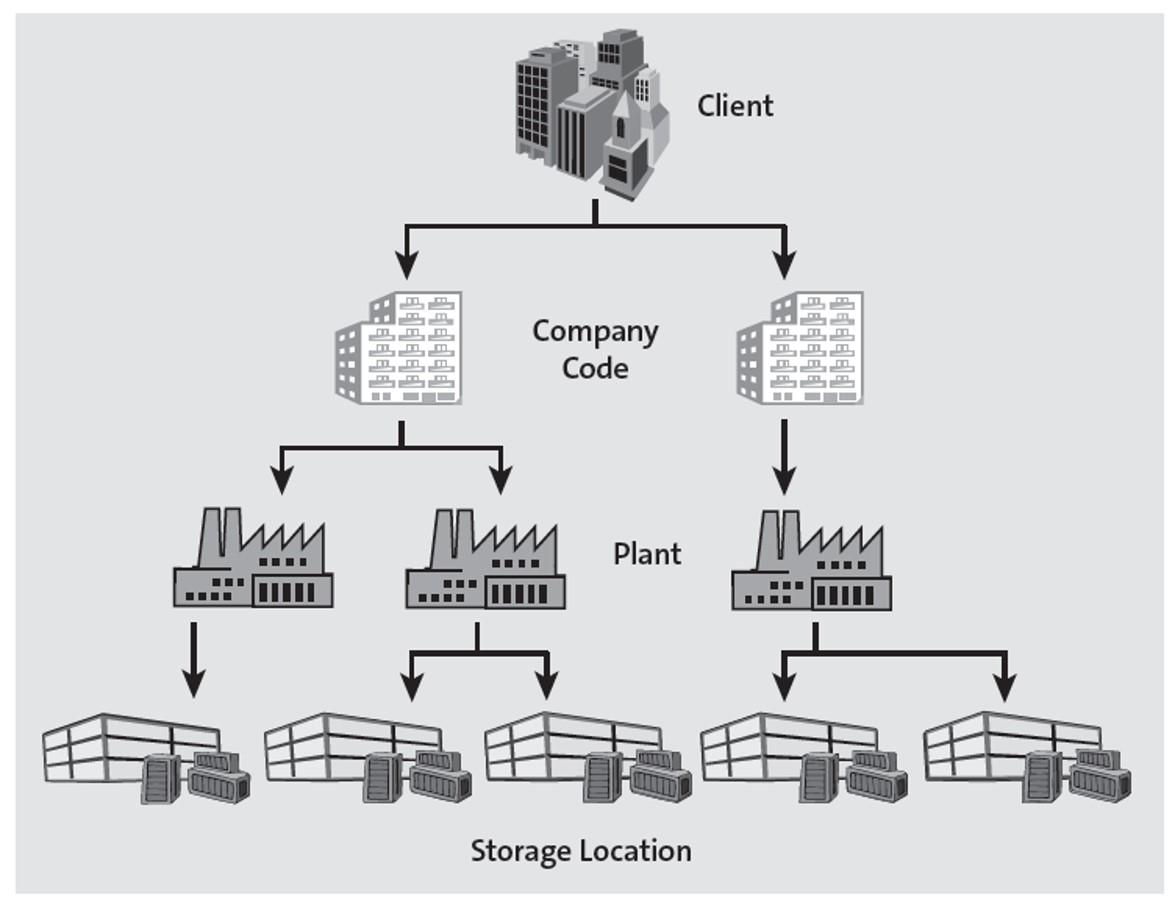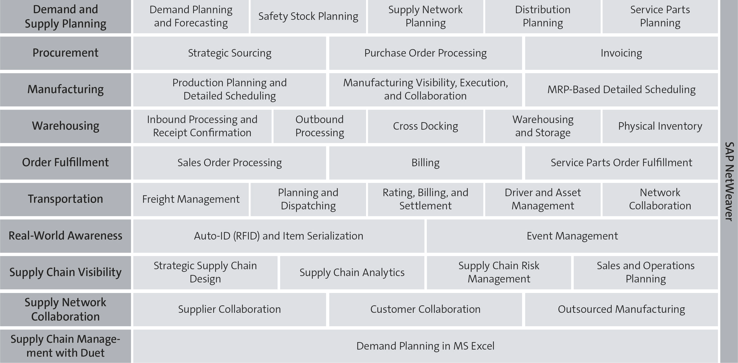

SAP Materials Management (SAP MM) is SAP’s solution for controlling the flow of materials, information, and finances across the supply chain. It covers procurement, inventory, and integration with key business processes such as production, sales, and finance. Available in both SAP ERP and SAP S/4HANA, SAP MM ensures the right materials are available at the right time and cost, integrating with modules like Production Planning, Warehouse Management, and Quality Management for end-to-end logistics efficiency.
Table of Contents
As part of the supply chain, SAP MM is a key driver in the logistics landscape of a business. Without it, the entire supply chain falls apart. It helps meet market demand by performing activities such as planning stock levels, minimizing work-in-process inventory, fulfilling customer orders, and collaborating with suppliers and other vendor partners.
MM revolves around three flows:
A material flow is focused on the materials themselves, and how they move from supplier to customer. Material flows begin when raw materials are ordered from a supplier, continue as the materials are turned into finished products, and typically end when headed out into transportation channels. In cases where returns are made by customers, the material flow process will continue as the product is sent back to the manufacturer.
An information flow is focused on order management, things such as delivery status and order turnaround time. This is important for providing transparency between the business and its customers, many of whom are looking for accurate and real-time information about the status of their orders.
A financial flow is focused on the value of the materials being used in the creation of a product. This is important for calculating values such as cost of goods sold (COGS) and for maintaining accurate bookkeeping in areas such as inventory accounts and accounts payable.

In addition to these flows, SAP MM plays an important role in larger and end-to-end business processes, such as:
In the procure-to-pay (sometimes called source-to-pay) process, users identify the raw materials they need to produce certain products, solicit quotes from suppliers, and choose the best offer for their manufacturing needs. Since this deals with acquiring materials, the material and financial flows are affected.
In the plan-to-product (sometimes called design-to-operate) process, businesses select the amount of raw and packing materials they need from their inventory and begin work on creating the product. Since this deals with movement of materials within the production warehouse, the material and financial flows are affected, including the actual costs incurred to produce the product.
In the order-to-cash (sometimes called lead-to-cash) process, businesses collect and fulfill orders from customers via sales orders. Since this deals with the movement of products and orders, the material, information, and financial flows are affected.
When companies maintain their plants with SAP Plant Maintenance or SAP S/4HANA Asset Management, spare parts and other consumables have to be procured and stored before they can be used (when necessary) and to ensure effective maintenance management. This inventory management falls under the purview of SAP MM.
Similar to maintenance management, as businesses look to expand or rebuild their plants and production equipment by purchasing assets, equipment, machinery and materials for the projects, the associated inventory of parts that go into such a capital project fall under the SAP MM umbrella.
SAP currently maintains two expansive ERPs (oftentimes referred to as “business suites”) for its customers. Both SAP ERP and SAP S/4HANA provide users the ability to perform MM tasks.
SAP ERP is SAP’s legacy business suite, and includes a massive SAP Materials Management component that houses MM data. SAP ERP will be maintained by SAP through 2027 with some additional, extended maintenance planned through 2030.

SAP S/4HANA is SAP’s current enterprise application suite. First released in 2015, it drastically simplifies processes compared to SAP ERP, and consists of numerous lines of business (LoBs) which also cover a host of business processes. The SAP S/4HANA Supply Chain, SAP S/4HANA Sourcing and Procurement, and SAP S/4HANA Manufacturing LoBs pertain to SAP MM.
Businesses migrating from SAP ERP to SAP S/4HANA will notice several changes in MM processes and terminology:
Business Partner model: In SAP S/4HANA, customers and vendors are unified into a single Business Partner master record, simplifying master data maintenance.
Mandatory Material Ledger: The Material Ledger is automatically active in S/4HANA, enabling actual costing and multi-currency valuation.
Simplified data structures: Tables and data models have been streamlined, reducing redundancy and improving performance.
Fiori-based transactions: Many MM tasks have moved from SAP GUI to SAP Fiori apps for a more user-friendly interface.
Understanding these changes helps ensure a smoother migration and faster adoption of the new system.
SAP is continually expanding its product functionality across all products, and the MM area is no exception. One of the most important MM-related features that SAP has introduced is the Material Ledger, a way to record, valuate, analyze, and report on inventory. With SAP S/4HANA, implementation of the Material Ledger becomes mandatory.
Another change to MM in SAP S/4HANA is the reorganization of the “customer” and “vendor” terminology found in SAP ERP. In the new suite, both fall under the term “business partner.”
| Topic | SAP ERP | SAP S/4HANA |
| Vendor master general data | General data | Business partner general data. |
| Vendor master company code data | Company code view | Access company code view through business partner role FI Vendor. |
| Vendor master purchase organization data | Purchase organization view | Access purchase organization view through business partner role Supplier. |
| Vendor master transactions |
Transactions XK01, XK02, and XK03 (Create, Change, and DISPLAY Vendor Centrally, respectively)
Transactions FK01, FK02, and FK03 - (Create, Change , and Display Vendor Accounting, respectively) |
The SAP Fiori app Maintain Business Partner is used to maintain vendors. Transactions related to vendor master transactions are obsolete in SAP S/4HANA. |
As SAP continues to explore different intelligent technologies such as AI and robotic process automation, further SAP MM enhancements are expected to be delivered to customers.
Materials management functionality is only one part of logistics, and it fits in alongside other SAP ERP modules and SAP S/4HANA LoBs to fulfill its main goal of getting products from conception to customer. Here’s an overview of key integrations:
It’s important to know how much of a product to create in order to meet demand, but also not have large amounts of unsold inventory sitting around. With production planning operations, businesses use historical data and other market demand signals to create a sales forecast and determine how much product to make in order to meet that forecast.
Once production begins, it’s important that the finished product meet certain standards imposed by the manufacturer, the customer, and in some cases, regulatory agencies. Quality management operations helps define those standards and aid businesses in selecting raw materials vendors, inspecting prototypes and products in production, and ensuring the final product is of a high quality.
Once a product is created, inventory levels and locations need to be managed. With warehouse management operations, businesses manage day-to-day warehousing operations, focused largely on stock. This includes picking and packing items when orders come in, and moving goods into, out of, and around the warehouse.
Goods will eventually need to be moved between point A and point B (or point C, D, etc.). Transportation management operations relate to these movements: how they occur, when they occur, and how to account for stock in transit, among others.
Organizations also take care of their fixed assets—the tools needed to create products, and the warehouse and vehicles used to move it around and to customers. With plant maintenance (or “enterprise asset management”) operations, businesses manage the wear and tear of these assets through preventive maintenance to ensure they are always ready for use as needed.
Once a product has been created and is awaiting dispatch, orders need to be formally acquired from customers before it can be shipped out. Sales and distribution operations focus on generating orders and getting the product out the door and to its final destination.
Finally, payment must be procured when a product is sold to a customer. FICO operations, while not a logistics topic per se, is tangentially related to MM as this is the area of the business that requests, records, and remedies payment-related aspects of the procure-to-pay, order-to-cash, and plan-to-product processes. Accounting for COGS and other production-related expenses are also accomplished in the FI and CO modules in SAP ERP and in SAP S/4HANA Finance.
Here are answers to some of the most common things SAP logistics users want to know about materials management.
What is SAP Materials Management (SAP MM)?
SAP MM is a module within SAP ERP and SAP S/4HANA that manages procurement, inventory, and material movement across the supply chain. It supports processes like procure-to-pay, plan-to-product, and order-to-cash.
What are the main flows in SAP MM?
SAP MM manages three flows: Material Flow (movement of goods), Information Flow (order tracking and status updates), and Financial Flow (valuation and cost tracking).
Which SAP S/4HANA lines of business cover SAP MM?
SAP S/4HANA Supply Chain, Sourcing and Procurement, and Manufacturing all include SAP MM functionality.
What are the key integrations for SAP MM?
SAP MM integrates with modules such as Production Planning (PP), Quality Management (QM), Warehouse Management (WM/EWM), Transportation Management (TM), Plant Maintenance (PM), Sales and Distribution (SD), and Finance (FI/CO).
What enhancements does SAP S/4HANA bring to SAP MM?
Enhancements include mandatory Material Ledger activation, the unified Business Partner model, and innovations in automation and AI.
While we’ve laid out much of the important terminology you’ll run into when performing materials management, there are a handful more concepts that will be helpful to you.
Learn more SAP from our official Learning Center.
And to continue learning even more about SAP MM, sign up for our weekly blog recap here: